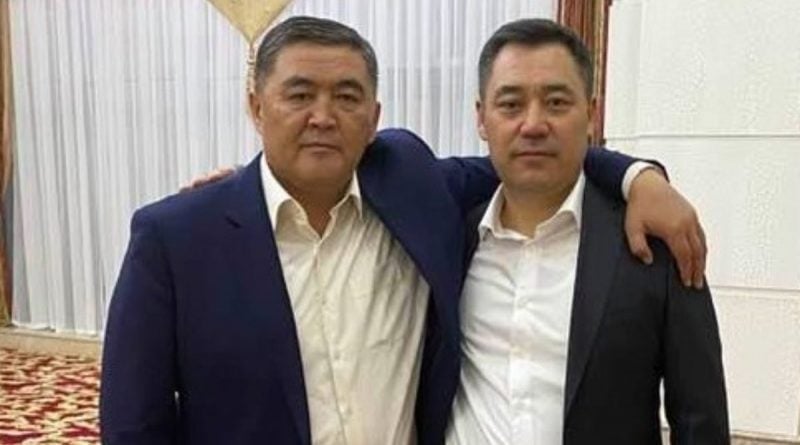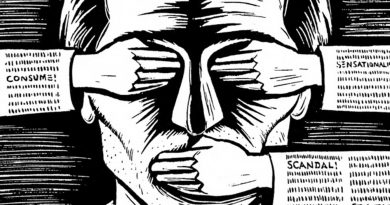Kyrgyzstan: Authorities use punitive measures against journalists
The Public Foundation “Media Policy Institute” (MPI) published the results of monitoring the situation with freedom of speech in Kyrgyzstan from October 2020 to March 2022.
The document states that the reporting period covers significant events affecting freedom of speech and expression of opinion in the country, the situation in the media environment of the republic, cites new challenges that have arisen in the specified period of time. As part of the monitoring, the social networks Facebook, Twitter, Instagram, WhatsApp and Telegram messengers were analyzed, and the statements of statesmen and politicians were studied.
The parliamentary elections on October 4, 2020 and the ensuing mass unrest led to another change in the top leadership of Kyrgyzstan. As a result of political turbulence, in mid-October 2020, a former member of Parliament, Sadyr Japarov, came to power – first in the status of Prime Minister and acting President, since January 2021 – as a full-fledged head of state elected in general elections.
Immediately after coming to power, Sadyr Japarov announced and subsequently implemented initiatives to change the Constitution and the political model of the republic by moving from a de jure parliamentary system to a super-presidential one under the pretext of strengthening the vertical of power allegedly slackened by his predecessors.
“Such large-scale changes in the basic law, leading to the strengthening of power in one hand and the destruction of the system of checks and balances met with predictable rejection and opposition from part of the population, political opponents of the new government and civil society. Sadyr Japarov, in response to this criticism, demonstrated his clear intolerance, accusing his opponents of disrespect for the people who had trusted him by electing him President in the elections. His dissatisfaction with criticism was voiced by him on various platforms, including social networks,” the study says.
In parallel with political changes and the consistent strengthening of the sole power of the President, de facto, authoritarianism, the situation in the field of freedom of the press and freedom of speech has worsened in Kyrgyzstan. Although from time to time President Japarov makes public assurances about the commitment to freedom of speech, the importance of independent media and the free use of social networks, new challenges have appeared for journalists – threats to the physical safety of journalists have become more frequent; legislative initiatives, that are contrary to the Constitution, are being proposed and adopted; against persons, criticizing the authorities, criminal cases are illegally initiated; those in power and their supporters actively use hate speech towards journalists.
“The negative attitude of high-ranking politicians and statesmen towards independent media, activists and opponents affected the physical and legal security of the latter. Since 2021, there has been an increase in the number of attacks on journalists and activists, as well as their persecution by law enforcement agencies,” the authors of the monitoring note.
In February 2021, searches were carried out and employees of the campaign headquarters of one of the presidential candidates, as well as blogger Yulia Barabina, were interrogated. The events were held as part of a criminal case opened on the fact of publishing critical posts about the authorities of Kyrgyzstan in a group on Facebook. According to the investigating authorities, the group posted ‘materials aimed at inciting intolerance on national and regional grounds, encouraging citizens to illegal and violent actions’.
As a result, one of the group’s administrators, blogger Yulia Barabina, was forced to leave Kyrgyzstan abroad. According to Yulia Barabina, she hasn’t been charged. And the criminal case hasn’t been closed yet.
In March 2021, police officers opened pre-trial proceedings against journalist Kanat Kanimetov under Article 119 “Petty hooliganism” of the Code of Misdemeanors (repealed in October 2021) due to a post on Facebook in which Kanimetov criticized the authorities because of the searches of Barabina’s house. Investigators suggested that such a publication could lead to ‘a worsening of the socio-political situation in the country’.
The rights of the journalist were defended by the lawyers of the Media Policy Institute, and in the autumn of 2021, their efforts were crowned with success: pre-trial proceedings against journalist Kanat Kanimetov were terminated due to the absence of fact of misconduct.
In addition to these cases, there were incidents with the security of journalists.
On April 11, 2021, during the local elections in Osh, unidentified athletes took away the phone from journalists and observers of Kloop Media, preventing them from covering the elections.
There was no investigation into the incident by law enforcement agencies.
On April 25, 2021, participants in a rally in Kurshab threw a journalist out of the Region TV channel, calling the media Kamchibek Tashiev’s ‘duty channel’. It should be noted that this time the police officers prevented a brawl, having managed to take the journalist out of the group of protesters.
On April 30, 2021, unidentified persons used force against Sputnik Kyrgyzstan’s journalist Zulfiya Turgunova, who was covering a meeting between the head of the State Committee for National Security, Kamchibek Tashiev, and residents of Batken region. She was forcibly taken away on her knees from the meeting place, and the head of the special services and the governor of Batken, who saw this, didn’t react to the incident. Zulfiya Turgunova herself refused to file a complaint with law enforcement agencies.
Unprecedented pressure on the media continued in 2022.
On January 20, 2022, independent investigators of Temirov Live portal published an investigation into the connection of relatives of the head of the State Committee for National Security Kamchibek Tashiev with the export of fuel oil and the oil business. Two days later, employees of the Ministry of Internal Affairs raided the editorial office with a search, with the support of special forces. They searched the journalists, confiscated all data carriers, and detained Bolot Temirov, the editor-in-chief of the portal, under the pretext of finding drugs on him, although the latter claimed that the agents themselves planted the substances on him.
“These actions looked like arbitrary, and, it seems, were committed in order to put pressure on the journalist in connection with his professional activities,” Nurbek Sydykov, a lawyer of the Media Policy Institute, commented on the incident.
He drew attention to the fact that the seizure and seizure of office equipment and documents in the framework of a criminal drug case cannot be legally justified.
In addition to Temirov, akin-improviser Bolot Nazarov, who voiced Temirov Live’s investigations in verse form in the Kyrgyz language, was also detained.
Against the background of outrage in the media community and the failure of the Ministry of Internal Affairs to bring Temirov to justice, he and Nazarov were released by the court under house arrest.
In parallel with “Bolotov case”, another story developed. It was concerned with the manager of the editorial office. Employees of the State Committee for National Security blackmailed her with an intimate video filmed in their own put-up situation, demanding to transfer data about the materials of Temirov Live. After the publication of the investigation about Tashiev’s relatives, the video was posted online, but later removed under public pressure.
“The position of the authorities on “Bolotov case” was extremely clear – Tashiev called all the team’s investigations false, ignoring the presumption of innocence, publicly called them drug addicts and drug dealers, although there was no court decision confirming this accusation. President Sadyr Japarov supported his friend, stating that journalists should beware of slander,” was noted in the study of the Media Policy Institute.
In February and March 2022, criminal cases were initiated against the editors of Kaktus.Media and Next TV channel. The first case was opened by the Prosecutor’s Office after the editors reposted the news about another border conflict (end of January 2022) of the Tajik media ASIA.Plus with active hyperlinks to the original source.
After a short time, the note was deleted due to the lack of an editorial comment by Kaktus Media.
On the fact of reposting, a criminal case was initiated under Article 407 “War propaganda” of the Criminal Code of the Kyrgyz Republic, i.e. “dissemination in any form of views, ideas or appeals with the aim of causing aggression of one country against another or unleashing of military conflict.”
According to the lawyer of the Media Policy Institute Nurbek Sydykov, representing the interests of the media, the reposted material didn’t contain any ideas, views or calls for aggression and military action, there were no signs justifying or substantiating such actions, therefore, the article couldn’t lead to any or negative consequences.
“In addition, the content of Article 407 suggests that actions must have a systemic, permanent nature of dissemination of views, ideas or appeals in order to provoke aggression of one country against another, which of course is not in the actions of the editorial staff. In view of the absence of these circumstances, we consider this criminal case unpromising,” Sydykov notes.
At present, the criminal investigation is ongoing.
These two high-profile cases, similar to each other, didn’t go unnoticed by the expert community. The Media Policy Institute regarded the organized discrediting of Kaktus.Media and the initiation of a criminal case against Bolot Temirov as part of a large-scale campaign to systematically squeeze out independent media from the Kyrgyz space of public discussion. The organization called on the authorities to stop arbitrary illegal criminal cases in connection with the professional activities of journalists.
Another example of pressure on the media: a criminal case against Next TV channel was initiated on March 3, 2022, after the publication on the Telegram channel of an interview by a former high-ranking Kazakh intelligence official about the likelihood of Kyrgyzstan and Tajikistan being drawn into the Russian-Ukrainian conflict on the side of Moscow. The case was opened on suspicion of ‘inciting hatred through the Internet by a group of persons by prior concert’. However, only the director of the TV channel, Taalay Dushembiyev, was detained and arrested for two months.
Commenting on this case, the media community of Kyrgyzstan issued another statement in which the case against the TV channel was characterized as a targeted persecution of the media and journalists. Lawyers of the Media Policy Institute note that the detention of the director of Next TV is contrary to the Constitution.
The International Committee to Protect Journalists (CPJ) demanded his release. And Ombudsman Atyr Abdrakhmatova called on the State Committee for National Security to respect the freedom of the media guaranteed by the Constitution.
“The above facts indicate that the state is increasingly using its punitive measures to combat objectionable people, including journalists, bloggers, and the media. This trend is likely to grow, given the intolerance of the top political leadership towards criticism,” the authors of the monitoring concluded.




